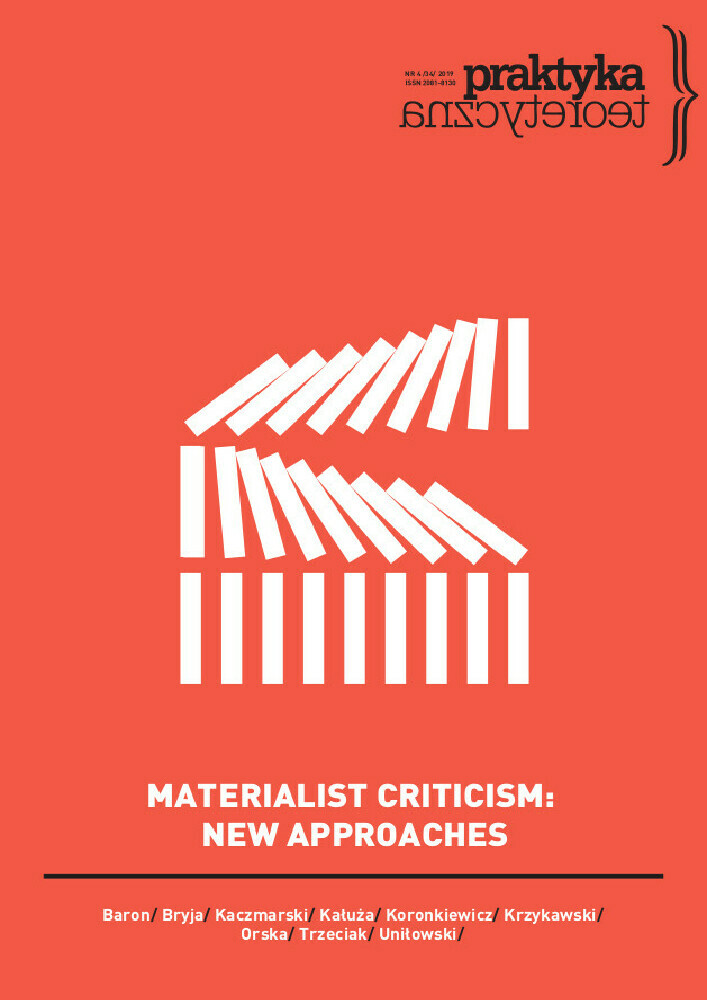Abstract
The author makes a comparative study of The Meursault Investigation by Kamel Daoud and Albert Camus’ works (especially The Stranger and The Fall) based on the literature describing the category of détournement. The theoretical basis of the notion of détournement is reconstructed from the works of Guy Debord, Jacques Derrida and Judith Butler and it becomes the basic category in the interpretation of postcolonial literature. The main aim of the article is to highlight the importance of this category as one of the strategies of postcolonial writing. The author claims that the purpose of using interception in literature is to renegotiate the structure of the canon and position of writers excluded from its structure because of economic, political and cultural conditions. In the first part of the article, the author points out the essential differentiators of détournement. She introduces the formula of the structure of the literary canon created by David Damrosch. Next she analyses two literary narrations dialoguing with each other. Comparison of the canonical story about Meursault’s murder and trial by Camus and The Meursault Investigation by Daoud reveals a strict relation between these novels. In Daoud’s story, the narration is inverted—the perspective of a victim, which is expressed by the brother of nameless Arab, dominates in the book. The analysis ends with the conclusion that détournement of a canonical work, and its recontextualization, is a more revolutionary gesture, made by postcolonial writers, who want to renegotiate their position in the structure of the canon, compared to nativist, utopian reproduction of the precolonial past. The choice of this particular strategy of writing confirms the truth of two claims of which Daoud is aware (as evidenced in novel): first, that every literary work is iterable and, second, that every revolution is only an apparent renouncement.
References
Ally, Hamza Karam. 2018. „The Stranger and The Other. Radical Alterity in Albert Camus’ The Stranger and Kamel Daoud’s The Meursault Investigation”. Otherness: Essays and Studies 6 (2): 259–280.
Barthes, Roland. 2009. Stopień zero pisania oraz Nowe eseje krytyczne. Tłum. Karolina Kot. Warszawa: Wydawnictwo Aletheia.
Butler, Judith. 2010. Walczące słowa. Mowa nienawiści i polityka performatywu. Tłum. Adam Ostolski. Warszawa: Wydawnictwo Krytyki Politycznej.
Camus, Albert. 2018. Obcy. Tłum. Marek Bieńczyk. Literatura na Świecie 7–8: 5–84.
Damrosch, David. 2010. „Literatura światowa w dobie postkanonicznej i hiperkanonicznej”. Tłum. Anna Tenczyńska. W Niewspółmierność. Perspektywy nowoczesnej komparatystyki. Antologia, red. Tomasz Bilczewski. Kraków: Wydawnictwo Uniwersytetu Jagiellońskiego.
Daoud, Kamel. 2015. Sprawa Meursaulta. Tłum. Małgorzata Szczurek. Kraków: Wydawnictwo Karakter.
Daoud, Kamel. 2016. „Ludzie, którzy wychodzą od absurdu, kreują sens”. Rozmawia Maciej Kałuża. Estetyka i Krytyka 40: 127–136.
Debord, Guy i Gil J. Wolman. 2010. „Przechwytywanie – instrukcja obsługi”. Tłum. Marcin Adamczak. W Miasto w sztuce – sztuka miasta, red. Ewa Rewers. Kraków: Universitas.
Debord, Guy. 2006. Społeczeństwo spektaklu oraz Rozważania o społeczeństwie spektaklu. Tłum., wstęp i komentarz Mateusz Kwaterko. Warszawa: PIW.
Derrida, Jacques. 2002. „Sygnatura, zdarzenie, kontekst”. Tłum. Janusz Margański. W Derrida, Jacques. Marginesy filozofii, Warszawa: Wydawnictwo KR.
Kałuża, Maciej. 2018. „The Narrative of The Meursault Investigation: Is it the Story of The Stranger, Told by Clamence’s Double?”. Journal of Camus Studies 2017, red. Peter Francev: 55–66.
Palich, Natalia. 2012. „Wyzwoleni z tradycji? Literatura i krytyka postkolonialna wobec kanonu”. W Tradycja współcześnie – repetycja czy innowacja?, red. Anna Jarmuszkiewicz, Justyna Tabaszewska. Kraków: Wydawnictwo Uniwersytetu Jagiellońskiego.
Thieme, John. 2001. Postcolonial con-texts. Writing back to the canon. London – New York: Continuum.
Vatsov, Dimitar. 2015. „Performatyw: suwerenna władza zamiast subwersji? (Austin, Derrida, Butler)”. Tłum. Weronika Szwebs. Przestrzenie Teorii 23: 217–240.
License
“Theoretical Practice” seeks to put into practice the idea of open access to knowledge and broadening the domain of the commons. It serves the development of science, thinking and critical reflection. The journal is published in open-access mode under the CC-BY-NC-SA 4.0 license (detail available here: http://creativecommons.org/licenses/by-nc-sa/4.0/). Articles published in the journal may be freely distributed, stored, printed and utilized for academic and teaching purposes without restrictions.
They should not be, however, used for any commercial purposes or be reconstructed into derivative creations. Access to the journal may not be limited or offered for a fee by any third party.
Prospective authors are obliged to fill in, sign and send back the publishing contract compliant with the CC licencing. [PL.pdf, PL.doc, EN.pdf,EN.doc].
According to this contract, authors grant the journal a non-exclusive right to publish their work under the creative commons license (CC-BY-NC-SA 4.0) without any financial obligation on both sides of the contract.
Before submission authors should make sure that derivative materials they use are not protected by copyright preventing their non-commercial publication. Authors are responsible for any respective copyright violations.
